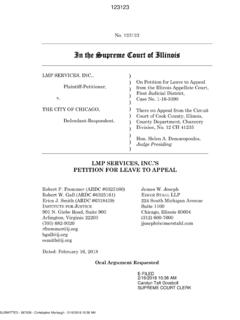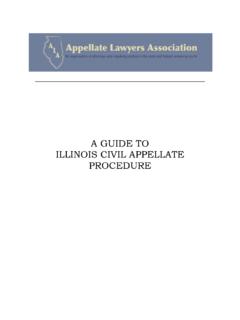Transcription of No. IN THE SUPREME COURT OF ILLINOIS
1 1 No. _____ IN THE SUPREME COURT OF ILLINOIS STATE OF ILLINOIS (DEPARTMENT OF ) Motion for Direct Appeal Pursuant to CENTRAL MANAGEMENT SERVICES), ) SUPREME COURT Rule 302(b) ) Petitioner, ) ) v. ) On administrative review from the ) December 13, 2016 Decision and Order of AMERICAN FEDERATION OF STATE, ) the ILLINOIS Labor Relations Board, Cons. COUNTY AND MUNICIPAL EMPLOYEES, ) Nos. S-CB-16-017 S-CA-16-087, to the COUNCIL 31 and STATE OF ILLINOIS , ) Appellate COURT of ILLINOIS , Fourth District, ILLINOIS LABOR RELATIONS BOARD, ) General Appeal No. 4-16-0827 and Cons. STATE PANEL, ) Nos. 04-17-0125, 04-17-0126, and 04-17- ) 0127 Respondents. ) MOTION FOR DIRECT APPEAL PURSUANT TO SUPREME COURT RULE 302(B) Petitioner ILLINOIS Department of Central Management Services (the State ), respectfully moves the COURT to order that the parties petitions for administrative review of the Respondent ILLINOIS Labor Relations Board s ( Labor Board ) December 13, 2016 Decision and Order currently pending before the Fourth District Appellate COURT be taken directly to the SUPREME COURT pursuant to ILLINOIS SUPREME COURT Rule 302(b).
2 The State s motion arises from the Labor Board s determination that that an impasse exists in negotiations for a successor collective bargaining agreement between the State and its largest public-sector union, AFSCME Council 31 ( AFSCME ). That determination and the resulting litigation, including a stay entered by the Appellate Courts, are unprecedented and raise issues of first impression concerning the proper legal test for determining when an impasse exists under the ILLINOIS Public Labor Relations Act ( Labor Act ). The proper test is literally a $3 billion question; that is the value of the savings 2 that AFSCME has prevented the State from realizing by stymying implementation of the State s last, best and final offer ( LBFO ) based on the Labor Board s impasse determination.
3 Time is of the utmost importance; with each day that passes the State incurs millions of dollars in expenditures that would not be made under the LBFO. Unless this COURT grants a direct appeal and resolves this case in an expeditious fashion, the impasse with AFSCME and the stay issued by the Appellate COURT pending resolution of the impasse issue will prevent the State from implementing the health insurance plan contained in its LBFO entirely. I. BACKGROUND A. The Labor Board found that the State and AFSCME reached an impasse in labor negotiations during the state s historic fiscal crisis The bargaining that gave rise to the impasse at issue in this case was the longest bargaining in the parties history.
4 (SR 190) The parties bargained on 67 separate days over 11 months (SR 42-43) but were still more than $3 billion apart when they reached impasse on their negotiations over a new CBA on January 8, 2016 (SR 452 at 6). The negotiations took place against the backdrop of the State s historic financial crisis. (SR 53-55) On January 6, 2016, shortly before the State declared impasse, the State projected a $ billion deficit for FY 17, $ billion deficit for FY 18, and a $5 billion budget deficit for FY 19. (SR 55) The projected budget deficit over all four years of the AFSCME contract at the time the parties reached impasse was approximately $20 billion. (See SR 53) In light of these facts, the State asked AFSCME to help address this fiscal crisis at the bargaining table by, among other things: (1) establishing a new health insurance plan modeled after private sector plans that offered employees more choices of coverage and that would save nearly $ billion over the life of the contract as compared to AFSCME s demands (SR 458-59 at 71-83).
5 (2) freezing wages and steps during the term of the contract, which it projected 3 would save the State nearly $900 million over the life of the contract as compared to AFSCME s proposal (SR 454-55 at 24, 29, 36, and (3) agreeing to provide the State with more flexibility to subcontract but protecting bargaining unit employees through a managed competition proposal that would allow them to bid on such work. (SR 88-90) The State believed AFSCME could be a partner in addressing the fiscal crisis, because the State employees that AFSCME represents are the nation s highest paid after adjusting for cost of living (SR 521), while the base salaries paid to AFSCME employees alone, , not including overtime, pension contributions, or FICA taxes, cost the State $ billion per year.)
6 (SR 460) However, AFSCME rejected the State s savings proposals, stating there was no way the State s fiscal crisis would be solved at the bargaining table (SR 59), and, as the negotiations came to a halt, AFSCME s lead negotiator stated, I have nothing else to say and I m not interested in hearing what you have to say at this point, carry that message that back to your principals. (SR 467) Since impasse was reached in January 2016, the State s bill backlog has risen to more than $12 billion. (SR 476) The State projects a $ billion deficit in FY 17 and over $7 billion deficits in both FY 18 and FY 19. (SR 460) Further, under the latest appropriation bill enacted into law, the State lacks the authority to spend $ billion out of General Revenue Funds for FY 17 that is needed to maintain the status quo with respect to health insurance, or to spend on most expenditures after December 31, 2016 (See 99-0524 (the so-called stop gap budget); SR 527).
7 1 The State s unfunded pension liability has swelled to approximately $130 billion. (SR 483) The State s credit rating was downgraded again in November 2016 (SR 498), even though it was already the lowest of any state in the nation. (SR 419) 1 The SUPREME COURT may take judicial notice of the records of the Comptroller, GOMB and COGFA, and of Public Acts such as 99-0524, the stop-gap budget bill. The State has not attached a copy of 99-0524 because it is over 800 pages. 4 The Labor Act allows an employer to implement its LBFO when the parties have reached a legitimate impasse. (SR 185) Here, however, the parties agreed that during bargaining, neither party would engage in a strike or a lockout.
8 Instead, by written agreement, the parties agreed that any dispute over the existence of an impasse would be presented to the Labor Board (the Tolling Agreement ). (SR 186) Through a pair of competing unfair labor practice ( ULP ) charges, Labor Board Consolidated Case Nos. S-CB-16-017 and S-CA-16-087, the parties presented the impasse case to the Labor Board in early 2016. (SR 38) B. The Labor Board recognized that the parties are at impasse After 25 days of hearing on the ULPs under the Tolling Agreement, an ALJ issued a 250-page recommended decision and order ( RDO ). The RDO recommended that the Labor Board find, among other things: (1) the parties generally bargained in good faith and that four of the five factors under the traditional impasse test weigh in favor of finding an overall impasse (SR 277 & 187-0257 ); (2) the parties reached an agreement on eleven bargaining packages (SR 66-74) and were at impasse on nearly all of the remaining proposals (SR 258-70); (3) AFSCME failed to prove the vast majority of its unfair labor practice allegations (see generally SR 28-432).
9 (4) to the extent that AFSCME s ULP allegations had any merit, the allegations did not cause the impasse (SR 277 (4) AFSCME s own conduct called into question its commitment to reaching an agreement through bargaining (SR 194-256); and (5) if the Board adopted the single critical issue impasse test applied under the National Labor Relations Act ( NLRA ), the parties were at impasse on the single, critical issue of subcontracting. (SR 276-79) Both parties filed exceptions to the ALJ s RDO with the Labor Board. On December 13, 2016, the Labor Board issued a Decision and Order. As relevant here, that Decision and Order (1) rejected the ALJ s partial implementation remedy; (2) held that the parties were at impasse 5 and in doing so, adopted the NLRB s single critical issue impasse test and found that the test was satisfied (SR 15-22); and (3) held that the handful of ULPs upheld did not cause the bargaining impasse and therefore did not preclude an impasse holding.)
10 (SR 3 & 15-22)2 The State and AFSCME filed petitions for administrative review with the Fourth and First Districts, respectively. On January 31, 2017, this COURT transferred AFSCME s petitions for administrative review to the Fourth District and consolidated those cases with the State s petition for administrative review. (See SR 436) The parties respective petitions are now pending in the Fourth District as General No. 4-16-0827 and Cons. Nos. 04-17-0125, 04-17-0126, and 04-17-0127. (See SR 433) While the petitions were pending, on December 22, 2016, AFSCME filed a motion in the First District to stay the Board s ruling. (See SR 435) The next day, before the State could respond, that COURT granted a temporary stay, which the Fourth District made permanent on March 1, 2017.









